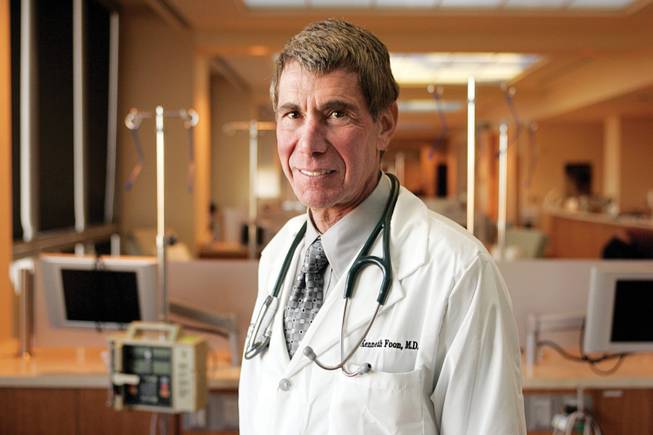
Dr. Kenneth Foon of the Nevada Cancer Institute has come up with an improvement in a type of therapy for leukemia.
Thursday, Feb. 19, 2009 | 3:44 p.m.
Related story
Working off the assumption that more isn't always better, Nevada Cancer Institute researcher Dr. Kenneth Foon found that when treating a form of leukemia, less is more.
The drug combination known as FCR has been effective in reducing tumors but also kills white blood cells — leaving the patients vulnerable to infections, which can be lethal when not treated quickly.
By reducing the toxic chemotherapy drugs — F and C in the combo — and increasing the R antibody drug used in the treatment for chronic lymphocytic leukemia, or CLL, Foon's trial concluded the drugs are just as effective without leaving the patients exposed to infections.
He calls it FCR-Lite.
Foon's new regimen reduced the toxicity in the bone marrow from 51 to 13 percent. His trial also eliminated the disease in 77 percent of the patients.
"Every now and then you just hit a home run. I knew it reduced the bone marrow toxicity. I didn't know it would reduce it four or five fold," he said.
Doctors can now use his treatment, which is explained in the Feb. 1 edition of the Journal of Clinical Oncology.
Foon conducted the research at the University of Pittsburgh Cancer Institute, where he worked for six years before relocating to Summerlin last year.
Twenty-five years ago, doctors could control CLL, the most common form of leukemia affecting adults in North America and Europe, but couldn't make the tumors disappear. In the past 10 years, a number of drugs and therapies, including FCR, have proved effective but make patients sick or leave them vulnerable to infections.
"Everybody is always looking to increase doses, add new drugs. I just took a different perspective," he said. "None of therapies are curative, eventually all will relapse. My feeling is 'why would I not want to use the less toxic therapy?'"
It's been just three years since his study so the long-term effects are unknown. However, Foon said, the patient responses are as good or better than older regimen. Not one of those who had a complete remission has any sign of the disease.
"There's no reason to believe that my complete responses aren't going to be as good as theirs," he said.
The trial included 50 patients and, while a small sample, Foon said, he hopes other researchers will conduct larger studies.
He's moving on to his next trial — seeing if reducing the number of treatment cycles has the same effectiveness. He expects to begin the trial next month using local patients.
Jeff Pope can be reached at 990-2688 or [email protected].

Join the Discussion:
Check this out for a full explanation of our conversion to the LiveFyre commenting system and instructions on how to sign up for an account.
Full comments policy